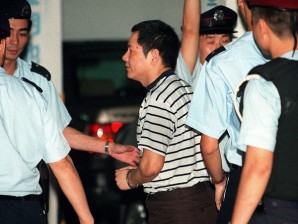Broken Tooth a living reminder of Macau’s vicious past

In this file picture taken May 12, 1998, Wan Kuok-koi (C), popularly known by his nickname “Broken Tooth,” is lead handcuffed into a Macau courthouse by police where he faced charges of involvment in triad activities. AFP FILE PHOTO
Macau – The release from jail next month of a triad boss known as Broken Tooth is fuelling speculation that the Chinese gambling playground of Macau could be on the verge of a return to the vicious gang violence of its colonial past.
Wan Kuok-koi will walk free from prison on December 1 having served 14 years and seven months for offences committed as the enforcer of the 14K triad, the largest organised crime outfit in the then-Portuguese colony in the mid-1990s.
Newspapers in Macau and nearby Hong Kong have run stories with headlines like “Crime Lord Returns”, while the New York Times has asked whether the recent bashing of an old Wan rival meant the southern Chinese city is on the verge of a “new gang war”.
Experts agree that Wan’s reappearance will rekindle memories of some of Macau’s darkest days, when his men fought a violent street “war” against their enemies from the Soi Fong gang in the years before the 1999 handover to China.
But few pay any heed to his reported jail-cell mutterings about reaping revenge upon his old foes, or fear a new cycle of triad violence.
Article continues after this advertisement“The Portuguese government was almost leaving and at that time, the public order, everything went very bad, the triads’ activity was very rampant,” Macau University Professor of Criminology Jianhong Liu recalled.
Article continues after this advertisement“After the handover, everything has changed sharply… It is hard to make statements saying there is no triad activity in Macau. But overall, I think those activities, even if they are there, are contained very well.”
Macau’s casino sector has been opened up to foreign competition and taken from the smoky backrooms of Broken Tooth’s day, when gambling tycoon Stanley Ho ruled the roost.
The semi-autonomous territory in the Pearl River delta now earns five times the revenue of Las Vegas.
US operators such as Sheldon Adelson’s Las Vegas Sands and Steve Wynn’s Wynn Resorts have entered the market, helping to transform a swampy area on the outskirts of the old city into the world’s premier gambling resort destination.
“Things have changed dramatically. It is not possible for Macau to go back,” Liu told AFP, adding that the local police were now better equipped and more closely integrated with their counterparts in Hong Kong and the mainland.
Most importantly, there was a “much stronger political will to combat any crime, any disturbance” that threatened social order and Macau’s reputation as a safe and legitimate place for Chinese gamblers to have a flutter.
“There must be some triad activity, certainly. But they are not expanding as people might imagine. I think it’s not expanding at any scale,” he said.
— “A legal void” —
Risk consultant Steve Vickers, the former head of the Hong Kong police criminal intelligence bureau, agrees that the old guard like Broken Tooth no longer pose a significant danger.
But he is far less sanguine about triad activity in general, seeing its reach extending in step with the boom in the city’s legitimate casino business.
Indeed, he believes Macau – the only city in China where casino gambling is legal – is riddled to its core with organized crime.
“The problems in Macau are very deep and go well beyond just a few low-end desperados,” he told AFP.
“Wan Kuok-koi was a particularly violent gangster who exploited the weak government situation at the time – that time has gone, his time has gone. It’s a completely different security situation now.
“The more difficult, pressing problem is the almost total control of junket operators by triad societies.”
Independent but hugely important players in Macau’s $35 billion casino business, junket operators arrange gambling trips for mainland Chinese high rollers, providing everything from call girls to money transfers.
Operating in what Vickers calls a “legal void”, the junkets also have the job of collecting their clients’ debts in exchange for a healthy cut from the casinos. They act, in effect, as an “informal financial system”.
“The Macau gaming business is underpinned by what is essentially illegal currency movement from the mainland,” he explained, referring to laws prohibiting Chinese nationals from moving more than $5,000 a day into the territory.
“The Macau junket model appears to guarantee criminal participation in the Macau gaming sector.”
Macau lawmaker Au Kam-san, of the New Macau Association party, acknowledges that “all the gangs have established their turfs in the respective casinos”.
But he says this should not necessarily be a problem as long as nothing happens to rock the boat.
“I don’t foresee a return of the violent past unless the gaming market shrinks dramatically and the pie is not big enough to be shared,” he said.
“The triad gangs in Macau have been around for a long time. As long as they can make their living from the casinos, they will not create a public disturbance.”